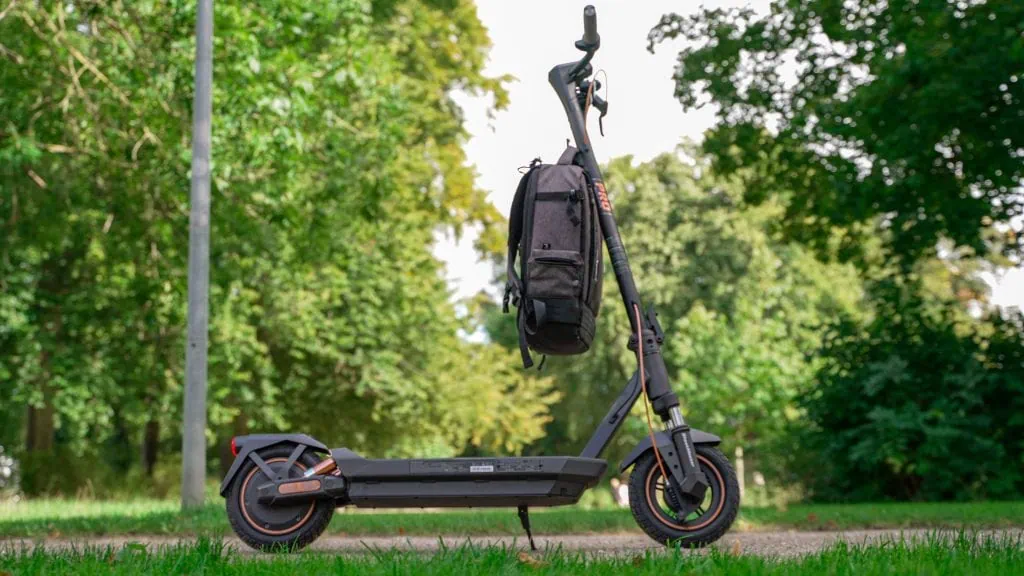
Our review score is based on thorough real-world testing and is always held up against comparable models.
How We TestValues marked with '*' are based on our independent testing and may differ from those specified by the manufacturer.


The GT3 Pro has a 400W motor (1000W peak) that delivers solid performance for urban commuting. The 48V system maintains consistent performance throughout the battery cycle and handles moderate hills well.
I clocked a top speed of 20.6 MPH in testing as a 175 lbs (80 kg) rider.
| Model | Top Speed | Motor (Peak) |
|---|---|---|
| Navee GT3 | 19.8 MPH | 350W (700W) |
| Navee GT3 Pro | 20.6 MPH | 400W (1000W) |
| Navee GT3 Max | 20.6 MPH | 400W (1000W) |
| NIU KQi 200F | 19.3 MPH | 350W (600W) |
| Segway E3 Pro | 19.3 MPH | 350W (600W) |
The GT3 Pro and Max share the same motor. They have a slight edge over all competitors here. More importantly, the 48V system maintains speed even at low battery, whereas the Segway E3 Pro (36V system) starts to feel sluggish below 50% charge.
The Navee GT3 Pro has a strong takeoff. Across 10 test runs, I averaged 0-15 MPH in 5.35 seconds.
| Model | 0-15 MPH (avg) | 0-20 MPH (avg) |
|---|---|---|
| Navee GT3 Pro | 5.35 s | 10.32 s |
| Navee GT3 Max | 5.35 s | 10.32 s |
| Navee GT3 | 6.12 s | - |
| NIU KQi 200F | 7.32 s | - |
| Segway E3 Pro | 7.85 s | - |
That's nearly 2 seconds faster to 15 MPH than the NIU KQi 200F and 2.5 seconds faster than the E3 Pro. The power delivery feels smooth and predictable, not jarring. You get decent pickup from a standstill without feeling like you're going to get thrown off.
Unlike NIU and Segway alternatives, the acceleration strength is non-adjustable, but the scooter doesn't feel like it needs to be tamed, so it doesn't matter much.
The GT3 Pro edges out the competition on my 250-foot test hill at 8% grade.
| Model | Time | Avg Speed |
|---|---|---|
| Navee GT3 Pro | 19.8 s | 8.5 MPH |
| Navee GT3 Max | 19.8 s | 8.5 MPH |
| Navee GT3 | 22.3 s | 7.6 MPH |
| NIU KQi 200F | 24.7 s | 6.9 MPH |
| Segway E3 Pro | 24.8 s | 6.9 MPH |
The GT3 Pro climbs notably faster than the 200F and E3 Pro. That 1000W peak power (and 48V battery) makes the difference. On my steepest 17% grade test, the GT3 Pro pushed hard but made it to the top without stopping. The 200F made it up too, while the E3 Pro failed.
For heavier riders or anyone with a hilly commute, the extra performance is important. You'll definitely feel a difference over both the 200F and E3 Pro.
The GT3 Pro delivers 23.3 miles of real-world range in my tests. The 477.4Wh battery (48V, 10.2Ah) is simply better value than the NIU 200F and Segway E3 Pro.
I conducted three standardized range tests at different speeds to see how much range the Navee GT3 Pro delivers in the real world.
| Test (#) | Range | Avg. Speed |
|---|---|---|
| #1: Speed Priority | 18.3 miles 29.5 km | 17.8 MPH 28.6 KMH |
| #2: Regular | 23.3 miles 37.5 km | 14.9 MPH 24 KMH |
| #3: Range Priority | 27.4 miles 44.1 km | 12.2 MPH 19.6 KMH |
Here's how the GT3 Pro compares to other affordable suspension commuters (based on the #2 regular range test results).
| Model | Regular Range | Battery |
|---|---|---|
| Navee GT3 Max | 29.1 miles | 596.7Wh |
| Navee GT3 Pro | 23.3 miles | 477.4Wh |
| Navee GT3 | 18.7 miles | 358Wh |
| NIU KQi 200F | 18.5 miles | 374Wh |
| Segway E3 Pro | 17.2 miles | 368Wh |
The GT3 Pro delivers 26% more real-world range than the 200F and 35% more than the E3 Pro.
Charging takes about 8 hours from empty on the GT3 Pro, which is fairly standard. Fast charging isn't recommended.
Apart from a slightly stronger motor on the GT3 Pro and Max, it's mainly the battery capacity that separates the three versions.
| Model | Battery | Weight | Regular Range |
|---|---|---|---|
| GT3 | 358Wh | 46.3 lbs | 18.7 miles |
| GT3 Pro | 477.4Wh | 48.5 lbs | 23.3 miles |
| GT3 Max | 596.7Wh | 50 lbs | 29.1 miles |
The Pro is gonna be the best balance for most riders. You get 25% range than the base GT3 at only 2.2 pounds more. If you need to go the distance, the Max gives you another 25% range at 50 lbs. Unless you regularly need 25+ miles per charge, the Pro makes more sense.
Which of the three represents the best bang for your buck depends on how prices fluctuate. Sometimes one version may be discounted more than the others, but even at their base prices, all three are good deals.
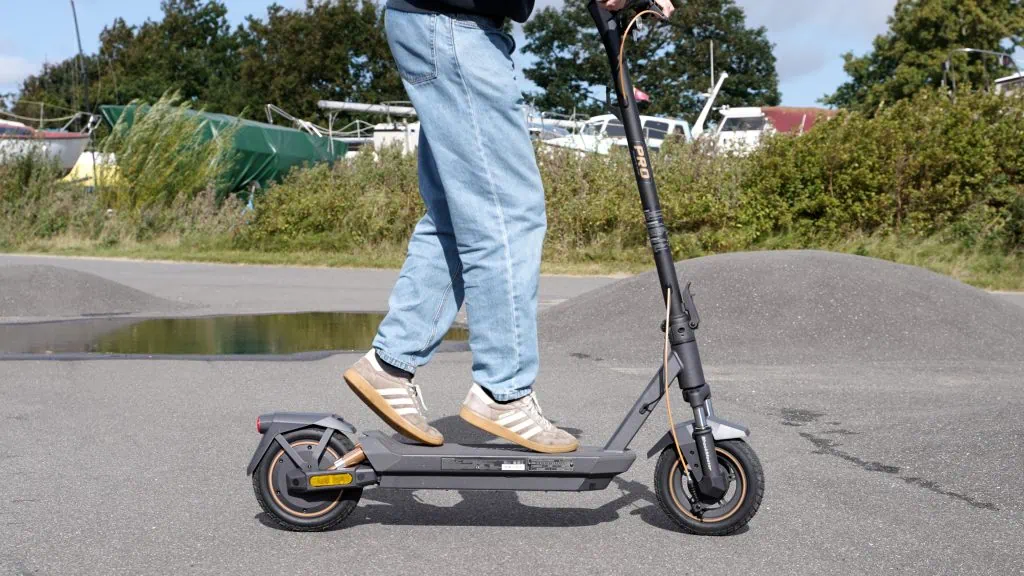
The Navee GT3 Pro is the most comfortable scooter I've ever tested at its price. Most budget scooters bring compromises, but the GT3 Pro delivers genuinely comfortable dual suspension and features that work.

The front fork and rear spring suspension work in perfect sync. Both engage progressively without one bottoming out while the other barely moves. The platform is always level, whereas it slants on some competitors. At 175 pounds, the tuning feels ideal with no bouncing or harsh bottom-outs.
The 10" x 2.5" tubeless tires reduce the risk of pinch flats compared to tubed tires. While they don't come pre-sealed with sealant, you can add it yourself for extra puncture protection.
I put the scooter to the test in varying terrain. It handles hard-packed trails really well and feels super grippy on wet roads, too. The TCS (Traction Control System) is very nice too and something you'll rarely see, but I definitely feel the difference, especially on rough roads.
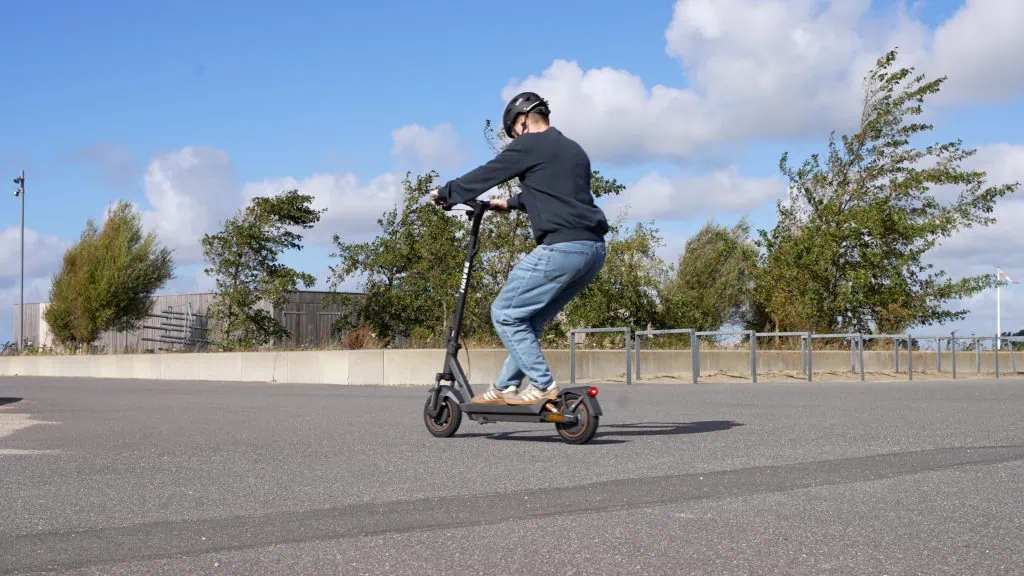
The Navee GT3 Pro keeps things low maintenance with a single front drum + regen brake. I measured a 14.1-foot stopping distance from 15 MPH, which is well within the safe range for a 20 MPH scooter.
| Model | Braking Distance | Brake Type |
|---|---|---|
| Navee GT3/Pro/Max | 14.1 ft | Drum + regen |
| NIU KQi 200F | 15.6 ft | Drum + regen |
| Segway E3 Pro | 16.5 ft | Drum + regen |
When I tested the more expensive Navee ST3 Pro, my main negative was that the regen felt jumpy. That isn't the case here. The GT3 Pro's regen surprisingly feels better. No dead zone, no jarring grab. It's progressive and predictable and can be tuned (3 settings) via the app.
The drum brake means close to zero maintenance. It's nice to see the major brands have finally figured out that discs for low-powered scooters are overkill.

At 21 by 6.9 inches, the deck gives you enough room to stand comfortably. The rear has a slight arch that has enough space to shift weight during acceleration and braking. Both dimensions exceed the NIU KQi 200F and Segway E3 Pro.

The 40.5-inch deck-to-handlebar height finally gives taller riders proper space. The wide 23.2-inch handlebars provide good leverage without feeling excessive.
I also really like the 5kg-rated hook for hanging a backpack. This was a lifesaver for my shoulders during range tests.

The GT3 Pro has a decent visibility setup. You've got turn signals at the handlebar ends, reflective side stickers, and a brake-activated taillight.
The adjustable headlight lets you aim it properly rather than blinding oncoming traffic or lighting up the sky. It's not as bright as the 200F's headlight, but it's perfectly fine for evening commutes.
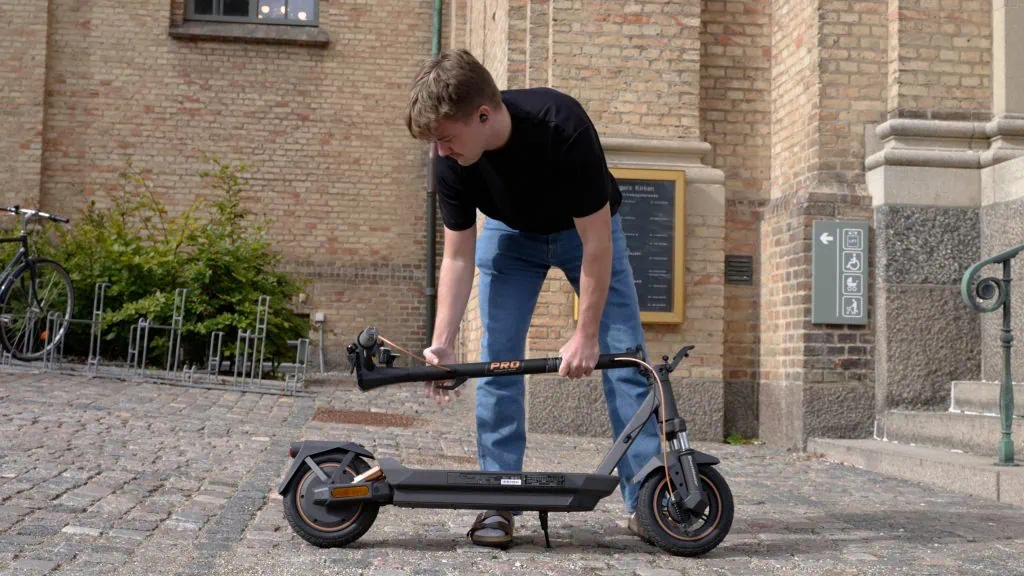
At 48.5 lbs, the GT3 Pro isn't the lightest commuter scooter. But those extra few pounds buy you full-sized comfort and performance.
| Model | Weight | Foldable Handlebars |
|---|---|---|
| Segway E3 Pro | 40.1 lbs | No |
| NIU KQi 200F | 44.1 lbs | Yes |
| Navee GT3 | 46.3 lbs | No |
| Navee GT3 Pro | 48.5 lbs | No |
| Navee GT3 Max | 50 lbs | No |
The E3 Pro saves 8 pounds, and the 200F adds foldable handlebars for a smaller folded footprint. But the E3 Pro runs on 36V and loses performance as the battery drops, while the 200F only has front suspension.
On the Navee GT3 Pro, you get a larger battery, consistent 48V performance, nicely tuned dual suspension, and a deck that actually fits larger riders. I personally think the weight is justified for what you're getting.
The folding mechanism works smoothly with a secure rear hook and safety pin. The weight distribution when folded is dead center, which makes carrying less awkward.
At 175 pounds, I find it perfectly fine for typical commuting needs. I regularly load it into a car or carry it up a flight of stairs. If you need the absolute lightest or most compact scooter around, there are better alternatives (see NIU KQi Air, for instance), but 48.5 lbs isn't bad at all, especially considering the build and hardware you're getting.
After 200 miles of heavy riding, the GT3 Pro has proven itself. I've simulated wear and tear, and the build feels as reliable and sturdy as day one.
The GT3 Pro has sizable dimensions and an overall beefy build with clean welds throughout. The geometry is optimal with a slightly angled stem, and I experienced no flex in the stem even when you really torque the handlebars.
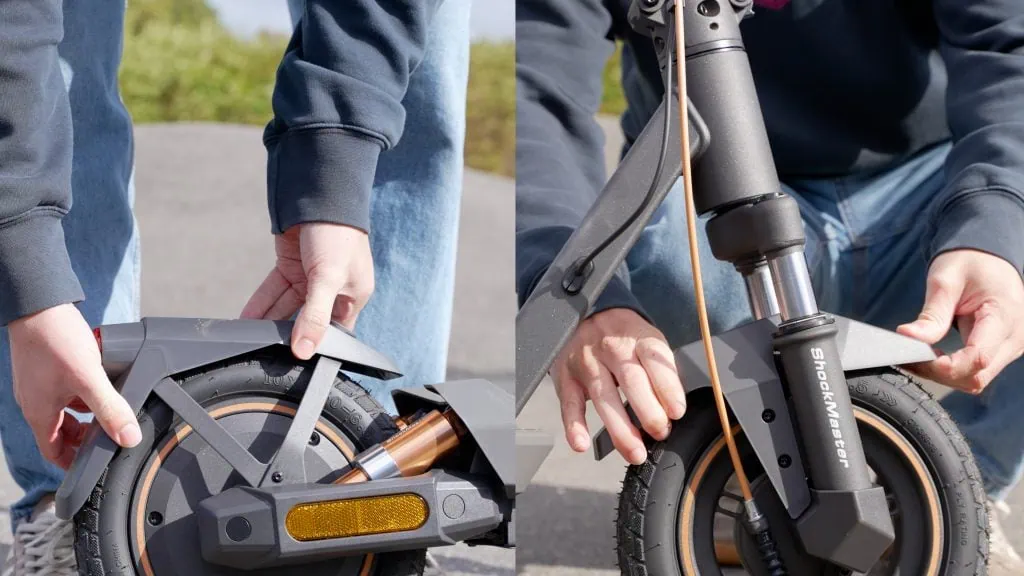
The fenders have multiple strong contact points, so they stay put without rattling or rubbing. I've pushed the scooter hard and given it some intentional abuse, and nothing has developed any play or looseness.
I stress tested the folding mechanism and kickstand through 200 and 500 cycles, respectively. Both have held up perfectly without weakening or loosening, and nothing has needed to be retightened.
Cable management is clean. Most wires run internally, and there are tight rubber gaskets at entry points to keep water and debris out.
IPX5 means it can handle some rain, and, anecdotally, it does. I've been soaked multiple times testing the GT3 Pro in Danish weather. All electronics stayed dry, the throttle never glitched, and the display hasn't been damaged.
Between the water resistance and maintenance-free drum brake, you've got a scooter that works year-round.
The Navee app does what it needs to without trying to be clever. Speed modes, TCS control, regen tuning, ride tracking, turn signal setup. Nothing fancy, but nothing broken either.
The missing pieces are noticeable if you're coming from NIU or Segway. I mainly dislike that you can't tweak acceleration curves. There's also no cruise control or zero-start. I'd also love to see battery care options like charging caps at 80% or 90%.
Maybe firmware updates will add these eventually. For now, you get the essentials, and they work reliably. Just know the customization is limited compared to the competition.

The Navee GT3 Pro is hands down the best value in budget commuters right now. You're getting features and hardware that normally cost a lot more. Dual suspension that actually works, a powerful motor, 48V consistency, and build quality that holds up. The app is basic, and it's not the lightest scooter, but those are minor gripes against what you're getting here.
